
Publisher:
Bonnie King
CONTACT:
Newsroom@Salem-news.com
Advertising:
Adsales@Salem-news.com

~Truth~
~Justice~
~Peace~
TJP
Feb-13-2014 11:09

 TweetFollow @OregonNews
TweetFollow @OregonNews
Burma Urged to Drop Census Questions on Ethnicity, Religion
Samantha Michaels & Yen Snaing The IrrawaddyAfter the last census in 1983, the military regime reported that Muslims constituted 4 percent of the population in the Buddhist-majority country, but this percentage may not be accurate.
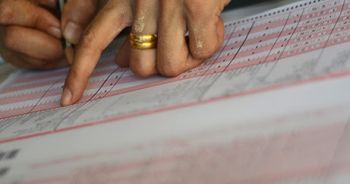 The questionnaire used during the Population and Housing Pilot Census in 2013. (Photo: Pyay Kyaw Myint / UNFPA) |
(RANGOON) - The International Crisis Group (ICG) is urging the Burma government and the United Nations to amend the country’s nationwide census survey, which includes questions that it describes as “needlessly antagonistic and divisive.”
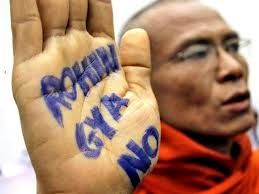 Buddhist ethnic cleanser |
The Brussels-based NGO on Wednesday echoed calls by Burma’s ethnic minority groups to postpone the collection of data on ethnicity, religion and citizenship status until a later, less volatile time. The government has recently defended the need to take down this information as soon as possible.
“While the collection of accurate demographic data is crucial for national planning and development—it has been over 30 years since the last census—the coming census, consisting of 41 questions, is overly complicated and fraught with danger,” the ICG said in a “conflict alert” statement.
“In addition to navigating its political transition from authoritarian military rule to democratic governance, Myanmar is struggling to end decades-old, multiple and overlapping ethnic conflicts in its peripheries. At the same time, recent months have seen an increasingly virulent Burman-Buddhist nationalist movement lead to assaults on Muslim minority communities. A census which risks further increasing these tensions is ill-advised.”
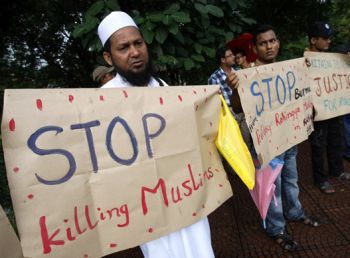 Rohingya protest |
While praising the government for its work to prepare for the census, which begins late next month, the ICG said the organizers—including Burmese officials, the United Nations and donors—have not paid enough attention to potential risks. It said there were flaws in the classification system for ethnic groups, and cautioned that collecting data on religious affiliations could feed into anti-Muslim sentiment that has led to outbreaks of sectarian violence.
In western Burma’s Arakan State, clashes between local Buddhists and Rohingya Muslims have left over 140,000 people displaced and over 200 people dead since 2012. Some Buddhists in the state say they fear the Muslim population is increasing too rapidly, and that Muslim men will attempt to marry Buddhist women and convert them to Islam.
After the last census in 1983, the military regime reported that Muslims constituted 4 percent of the population in the Buddhist-majority country, but this percentage may not be accurate.
“There are strong indications that the real figure collected then was over 10 percent, but that a political decision was taken to publish a more acceptable figure of 4 percent,” the ICG said. “The results of the current census could therefore be mistakenly interpreted as providing evidence for a three-fold increase in the Muslim population in the country over the last 30 years, a potentially dangerous call for extremist movements.”
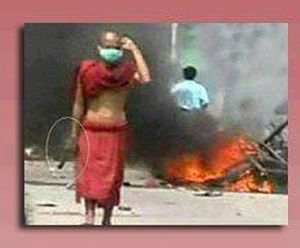 Armed Buddhist militant |
The group urged census organizers to only ask demographic questions covering age, sex and marital status. “This will provide the most important data without touching at this stage on the more controversial issues of identity and citizenship,” it said.
“The census process should be urgently amended to focus only on key demographic questions, postponing those which are needlessly antagonistic and divisive—on ethnicity, religion, citizenship status—to a more appropriate moment.”
The nationwide census will begin at the end of next month, with data collected from March 30 to April 10. With help from the UN Population Fund (UNFPA), the Burma government has created a survey that will require participants to identify as one of 135 ethnic groups. Non-citizens, which include Rohingya Muslims, can identify as “other” and write in their own ethnic group, as can citizens who belong to a group that is not recognized by the government as native to the country.
The results are important because they have major political ramifications: Ethnic groups that pass a certain population threshold can have ethnically delineated constituencies with representatives appointed as ministers in local governments.
Under military rule, ethnic minorities accused the government of inflating the numbers of the ethnic Burman majority to justify the dominance of Burman officials. Now similar concerns have surfaced about inaccurate representation. Some ethnic groups say the census survey inaccurately classifies certain ethnic subgroups or tribes as belonging to unrelated larger ethnic groups. Others say the classification breakdown of 135 ethnic groups is too divisive.
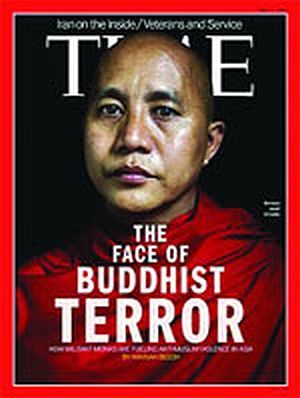 Caption goes here |
While taking note of these concerns, the government has defended the need to collect data on ethnicity. Earlier this week, Khin Yi, the minister of immigration and population, said that although many countries around the world do not include such questions in their census surveys, Burma needed to do so because its statistics were much more out-of-date.
“We are starting to collect this data only after 30 years, so we don’t know exactly how many ethnic people are here. That’s why we’re including this element. Other countries conduct a census once every 10 years,” he said at a press conference in Rangoon on Monday.
“It’s true that ethnic minorities worry their groups will disappear, that they will not get the ‘right to govern themselves’ in the upcoming election. But the census is not directly related with elections, although it may be indirectly. There will be no such thing as losing the right to govern themselves.”
Despite his reassurances, a number of major ethnic groups have called for the postponement of the census to hammer out some of these concerns. On Monday, ethnic Chin activists called for at least a 30-day delay of data collection in a letter to President Thein Sein, the immigration minister and the chairman of the central census commission.
“We have evaluated that some arrangements for the census will harm ethnic people, including the Chin. Especially the tribal groups’ names are wrong,” the Census Supporting Committee for Chin Ethnics wrote in the letter, adding that they were also concerned about potential conflict between various tribes.
In a separate letter to Parliament Speaker Shwe Mann, 23 ethnic Kachin civil society groups also called for postponement, again to allow for more discussion about the categorization of ethnic groups. They urged the government to drop the question about ethnic affiliation if no resolution is achieved over their concerns about classification.
Gen. Gun Maw, deputy chief of staff for the Kachin Independence Army (KIA), has also said the current time is not right for the census. Speaking Thursday in Chiang Mai, Thailand, he said ongoing clashes between ethnic armed groups and the government army could prevent data collectors from reaching certain areas in remote ethnic states.
“If the government takes the census now, the survey will be incomplete because there are many conditions, such as war and conflicts,” he said. UNFPA representatives working on the census were not available on Thursday to respond to requests for comment about the ICG statement
 |
 |
 |
Articles for February 12, 2014 | Articles for February 13, 2014 | Articles for February 14, 2014



Quick Links
DINING
Willamette UniversityGoudy Commons Cafe
Dine on the Queen
Willamette Queen Sternwheeler
MUST SEE SALEM
Oregon Capitol ToursCapitol History Gateway
Willamette River Ride
Willamette Queen Sternwheeler
Historic Home Tours:
Deepwood Museum
The Bush House
Gaiety Hollow Garden
AUCTIONS - APPRAISALS
Auction Masters & AppraisalsCONSTRUCTION SERVICES
Roofing and ContractingSheridan, Ore.
ONLINE SHOPPING
Special Occasion DressesAdvertise with Salem-News
Contact:AdSales@Salem-News.com

googlec507860f6901db00.html
Terms of Service | Privacy Policy
All comments and messages are approved by people and self promotional links or unacceptable comments are denied.
[Return to Top]
©2026 Salem-News.com. All opinions expressed in this article are those of the author and do not necessarily reflect those of Salem-News.com.